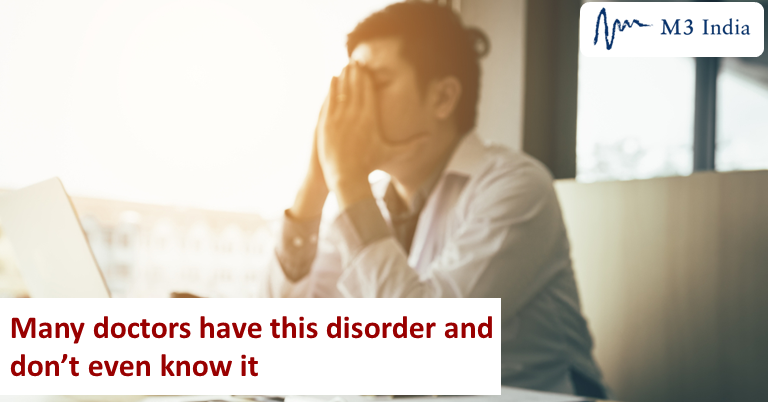Many doctors have this disorder and don’t even know it
M3 Global Newsdesk May 11, 2019
Summary
PTSD isn’t limited to military doctors or emergency physicians who often see or undergo traumatic incidents. Being an overworked and unfulfilled physician could lead to traumatic stress in some individuals.

“Posttraumatic stress disorder (PTSD) is underrecognized in physicians, even though it may be more prevalent in physicians than in the general population in the United States,” wrote psychiatrist Arthur Lazarus, MD, MBA, Palm Coast, FL, in The Journal of Medical Practice Management. “In addition to experiencing trauma, the cumulative stress of practice may cause PTSD,” Dr. Lazarus explained.
Take note that even in the general population, PTSD is fairly common, occurring in about 1 in 10 men and 2 in 10 women who’ve experienced trauma, according to the US Department of Veterans Affairs National Center for PTSD. So, if PTSD is more prevalent in physicians than in the general population, then it’s very common indeed among your colleagues.
“Research [on PTSD] has focused on firefighters and paramedics following natural disasters—for example, tornados and volunteer firefighters. There has been little formal research on doctors,” wrote Raj Persaud, MD, former consultant psychiatrist, Bethlem Royal and Maudsley Hospitals, London, United Kingdom, in The BMJ. “Despite this, it is clear from the limited research which has been conducted on medical teams that doctors are vulnerable to PTSD at levels of incidence that might be surprising to the profession.”
Indeed, researchers reported in a 2016 meta-analysis that the prevalence of PTSD among physicians was 14.8%, which agreed with findings from a 2012 study in which 15% of hospital physicians had PTSD. Compare these numbers with the 3% to 4% prevalence of PTSD in the general adult population—as well as the 20% to 45% prevalence range found among people traumatized by war or torture.
What is PTSD?
PTSD may occur in people who have experienced or witnessed a traumatic event, such as a natural disaster, a serious accident, a terrorist act, war/combat, rape, or other violent personal assault, according to the American Psychiatric Association (APA). Although many people who go through such trauma begin to recover in time, those with PTSD continue to have intense, disturbing thoughts and feelings that last long after the traumatic event has ended.
These disturbing thoughts and feelings cause “clinically significant distress or impairment in the individual’s social interactions, capacity to work or other important areas of functioning. It is not the physiological result of another medical condition, medication, drugs or alcohol,” according to the APA.
Symptoms of PTSD, which can vary in severity, are grouped into four distinct categories:
- Re-experiencing: Spontaneously re-experiencing sometimes vivid memories, dreams, or flashbacks of the traumatic event.
- Avoidance: Avoiding reminders of the traumatic event —including people, places, objects, and situations—that may bring up distressing memories. People with PTSD may try to avoid remembering, thinking, or talking about what happened or how they feel about it.
- Negative thoughts and feelings: These may include ongoing and distorted beliefs about oneself or others (eg, “I am bad” or “No one can be trusted”), as well as ongoing fear, horror, anger, guilt, or shame. Individuals may feel detached or estranged from others, or show much less interest in activities they previously enjoyed.
- Hyperarousal: Feeling on edge, on high alert, or “keyed up.” This may include being irritable and prone to angry outbursts, having reckless or self-destructive behavior, being easily startled, or having problems concentrating or sleeping.
Physicians with PTSD
According to Dr. Lazarus, five types of physicians appear to be particularly prone to developing PTSD:
- Emergency physicians, who may develop PTSD because they frequently treat trauma victims.
- Physicians practicing in underserved and remote areas, who are often stretched too thin, with insufficient resources.
- Physicians in training (ie, medical residents), who may be ill-prepared for traumatizing experiences, such as witnessing a patient die.
- Physicians involved in malpractice litigation, who develop PTSD as a result of a lawsuit. There’s even a name for it: medical malpractice stress syndrome.
- Physicians who are “second victims” (ie, those who witness someone else, such as a patient, go through trauma)—these physicians may be traumatized themselves, along with feelings of guilt or helplessness, by witnessing a patient’s poor outcome.
“The road to recovery for physicians with PTSD entails proper diagnosis and treatment, which includes maintaining a high index of suspicion for the occurrence of PTSD in predisposed physicians, and individual or group therapy,” Dr. Lazarus wrote. “Physicians in leadership positions should advocate for effective support programs for their colleagues with PTSD.”
Before physicians sign up for support programs, they must first realize and accept that they need help. In at least two studies, few to none of the physicians surveyed sought professional help for treating their PTSD. “Not seeking help…is particularly tricky to understand, for these individuals have a superb intellectual understanding of the long-term ramifications associated with not receiving the psychiatric care they might need to function normally,” wrote the authors of the 2016 meta-analysis.
Notably, the authors indicated that social support during internship may protect against PTSD, “further reinforcing the need for residency programs to consider organizing social events meant to cement the relationships between trainees, support staff, and senior faculty.”
This story is contributed by John Murphy and is a part of our Global Content Initiative, where we feature selected stories from our Global network which we believe would be most useful and informative to our doctor members.
-
Exclusive Write-ups & Webinars by KOLs
-
Daily Quiz by specialty
-
Paid Market Research Surveys
-
Case discussions, News & Journals' summaries